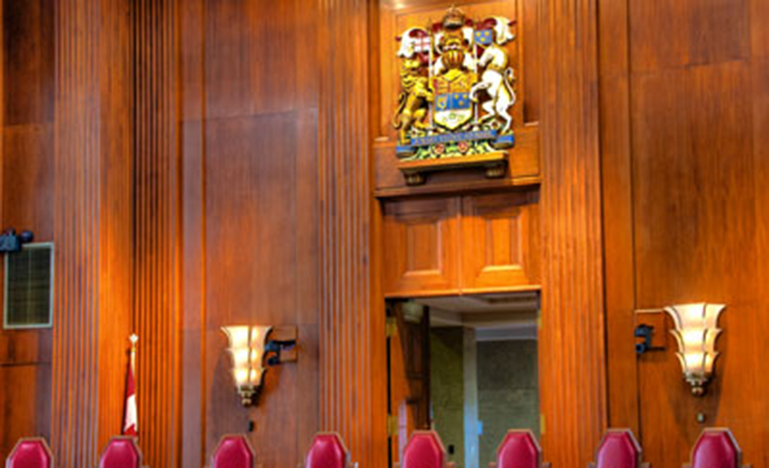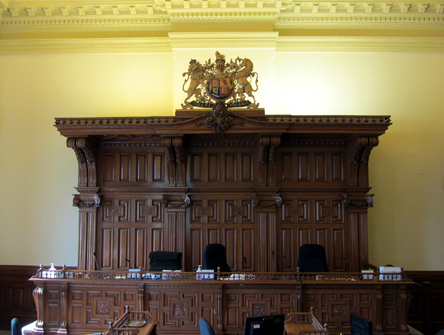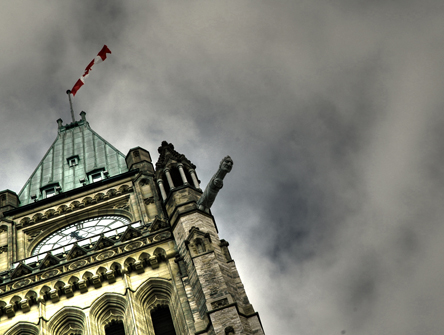The Supreme Court Act reference
It will be a challenge for the Supreme Court to separate the legal from the political in the Nadon reference, and to secure acceptance of its final ruling.

In January, the Supreme Court of Canada heard arguments in the reference regarding the Supreme Court Act, specifically concerning the eligibility requirements for judges from Quebec in light of the controversy sparked by Marc Nadon’s appointment to the Court. The case focuses on whether someone selected to fill one of the three Quebec seats mandated by statute can be appointed from the Federal Court or Federal Court of Appeal. The case will also likely deal with the constitutional status of the Supreme Court Act itself and whether or not a constitutional amendment is necessary to change the eligibility criteria for appointments.
These are significant legal issues of which much has been – and will continue to be – written. Yet the case is also notable from a political perspective. The circumstances in which the Court now finds itself deliberating on these questions are troubling because they have implications for both the Court’s legitimacy and for the future of the appointments process itself.
A number of factors place the justices in an awkward or difficult position. First, if the Court reaches the conclusion that Nadon was not eligible to sit on the bench, a reasonable question might be posed as to why the Court swore him in when his eligibility was in doubt. This is not something that should necessarily have any legal significance. The Court should no doubt be free to consider the arguments on both sides as it is doing, but as an institution that jealously guards its independence it is inconceivable that the justices would accept the appointment of someone who they believed was not entitled to join them. The formal legal challenge to the appointment was launched immediately following his swearing-in ceremony, but the debate about it was well under way. To the extent this poses a problem, it is one of perception. Avoiding the perception that they erred in allowing Nadon’s swearing-in in the first place may weigh on the justices’ decision.
Another factor is the potential damage to public perception of the Court in Quebec if the justices determine that Nadon is eligible. The Parti Quebecois government joined the chorus of critics of the appointment, who believe that the Supreme Court Act’s provisions on eligibility exist to ensure a continuous and up-to-date knowledge of the province’s civil law. It is difficult to imagine sovereignists resisting the temptation to make political hay out of a decision that, in their view, would undermine the very principle behind special statutory representation for Quebec on Canada’s highest court.
This would not be the first time the Court has been presented with an issue where the resolution threatened to harm its legitimacy in la belle province. Most political scientists and many legal scholars who have analyzed the 1998 reference on Quebec secession describe the judgment as an inherently strategic enterprise designed in part to avoid completely alienating the Court from Quebec nationalists. Asked whether Quebec could unilaterally secede, the justices said no. However, the Court went well beyond the obvious scope of the question posed to it and proceeded to articulate a duty to negotiate on the part of the rest of Canada. This is regarded by many constitutional experts as a political decision to avoid a potentially severe negative reaction from Quebec nationalists and preserve the Court’s reputation. It is difficult to believe the justices on the bench today are not cognizant of the potential for a negative fallout in Quebec if Nadon is deemed eligible. Whether that will influence their decision-making remains to be seen.
A third factor that makes this a potentially awkward decision for the Court is the fact that two former Supreme Court justices – Ian Binnie and Louise Charron – were asked by the government for their opinion on Nadon’s eligibility. Binnie wrote a short opinion that the relevant provisions of the Supreme Court Act allow the appointment. Charron agreed. Justices are no strangers to disagreement; indeed, the Court’s justices quite regularly disagree with each other and with the judgments of lower courts. But government-obtained legal opinions from retired Supreme Court justices are a rarity, and it is even more rare for them to immediately precede the same issue coming to the Court. It is possible Binnie’s opinion helped frame the issue for the Court. While it is unlikely to have a direct impact on the decision of the sitting justices, it adds another layer to the unprecedented nature of the case.
Yet another factor that will most certainly play a role is a likely desire on the Court’s part for a unanimous outcome. The nightmare scenario from an intra-Court collegiality perspective is a majority decision that Nadon is eligible from which some of the justices dissent. Chief Justice Beverley McLachlin is well known for her ability to achieve consensus in many difficult cases, and it will be interesting to see if she can do so here.
Finally, one of the most important political features of this controversy is the appointments process itself. This controversy is a direct result of the lack of transparency that infects the selection process. In recent years, a parliamentary committee composed of government and opposition members of Parliament has convened to shorten the prime minister’s “long list” of candidates into a short list. Not only is the work of the committee conducted behind closed doors, but its members are not permitted to say whether they agreed with the outcome or even whether the committee was unanimous. This is preposterous arrangement, and the opposition parties should seriously reconsider taking part in a process that effectively hinders their ability to properly hold the government accountable.
The politicization of Supreme Court appointments is something many have sought to avoid, but given the tremendous role the Court plays in adjudicating public policy and political issues in Canada, it is important to recognize that the selection of judges is inherently political. That we have thus far avoided outright partisan battles like those that occur in the United States, or that there have generally been “good” appointments to the bench, does not belie this fact. The closed-door system of appointments, in which the prime minister gets a virtually unconstrained choice in who to select, is simply not acceptable and the current controversy might have been avoided if there was more transparency and accountability embedded in the process.
In the result, the Court is very much in a no-win situation. It will either deem ineligible someone it has already sworn in or accept the appointment of someone whose eligibility many consider an affront to the special status civil law – and Quebec itself – ought to be accorded on the Court. Although there are clear questions of statutory (and possibly constitutional) interpretation at issue, the political context that surrounds the controversy will no doubt shape the outcome in a considerable way.


